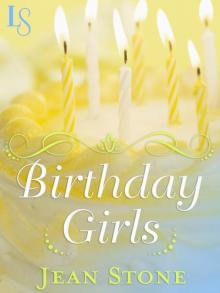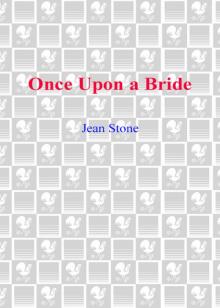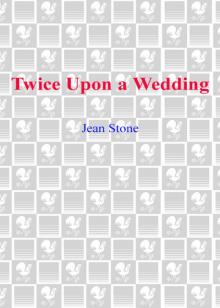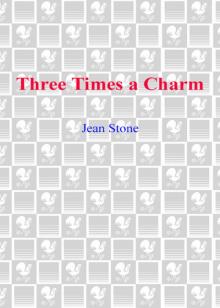- Home
- Jean Stone
Four Steps to the Altar Page 2
Four Steps to the Altar Read online
Page 2
Like Lily’s parents, Margaret doted on her, helped her immerse her young self in parties and in meeting the “right” boys. A right boy, after all, could make all the difference in the world, according to Aunt Margaret, who’d seen her share of right and wrong ones.
When Lily was in high school, she went to every West Point cotillion dressed in organdy and pearls and a glittering tiara. When it came time for college, she chose Winston College because it was not terribly far from West Point, and only two hours from home.
But just before Lily’s high-school graduation, when the lilacs offered the promise of a sweet-scented future, Lily’s parents—not one or the other, but both—were killed in an accident on the east side of the Bear Mountain Bridge. A drunk driver swerved toward them and smashed them head-on. Their bodies were flung onto the steep embankment; their station wagon went splat on the rocks, ending up—she’d overheard one police officer say to another—like a tuna-fish can that had been squished for that new process called recycling.
It hadn’t taken a war to steal her daddy from her, or her mother for that matter.
Lily’s guilt was all-consuming. Surely she’d been as much at fault as if she’d been behind the wheel of the drunk’s car herself.
But she rallied her lessons about dismissing pesky troubles, buried her emotions, and managed to go on. It was years, however, before Lily could face crossing a bridge, any bridge. And to this day, the sick smell of lilacs reminded her of horror and of death and of all things too painful to feel, and made her wonder what had ever happened to Cadet Billy Sears.
Her friends—not husbands one or two, not Reginald, and now not Frank—had no idea that Lily had any anguish at all. Or that there had ever been a sweet boy named Billy, her first love and first lover, who she had erased from her day-to-day, so-busy mind.
The tea was cold now; she really must get downstairs to work and stop dwelling on the fact that she’d lived without real love most of her adult life. With a short sigh, Lily pushed Billy to his special place inside her heart. But as she got up from her doll-sized table, Lily thought of Frank…. If Billy Sears had been her first love and those in between had been, well, survival tools—she hoped dear, deceased Reginald would forgive her honesty—then perhaps Frank was her real second chance.
Staring back out the window across the town common to Frank’s store, Lily suddenly wondered if she might invent a reason to go into New York—special baubles for wedding attendants, exotic fabric for one of Sarah’s creations, a distinctive silver samovar for Elaine’s catering needs. Because if Lily went into the city, she could see Antonia. Then maybe, just maybe, Lily might dare concoct a plan—short of downright asking—whereby she might end up with Frank Forbes and her share of the Beckwith money too.
“What did she say?” Sarah was asking Jo when Lily emerged an hour or so later in the shop, dressed in a modest beige light wool suit and wearing sensible Roberto Del Carlo low heels.
“Nothing,” Jo said as she slumped onto the chair, dropped her head onto the desk, and draped her arm over the back of her neck. “It was awful.”
“What could possibly be awful on a Monday morning?” Lily questioned. Her mood had elevated ten Bloomingdales’ floors since she’d cooked up her new mission. Lily always had been better at taking action than sitting at a table feeling sorry for herself. “The nurse and the carpenter were wed in grand style yesterday,” she chirped. “Our portfolio bulges with more pictures every day, and I need to make a quick trip to Manhattan.”
No one responded, as if she’d been an unwelcome interruption.
“That’s nice,” Elaine said finally, “but right now Jo has a problem.”
Lily didn’t want to deal with problems that day, not hers or anyone’s. But she shifted on her Del Carlos and asked, “What problem?” because they were her friends and because she knew they would want her to.
“Andrew’s daughter walked in on Jo when she was naked,” Sarah said.
Lily blinked. “Oh,” she said. “Pooh.”
“It’s worse than that,” Jo added. “I was in Andrew’s bed.”
Cassie was twelve now, they all knew that. Wasn’t twelve old enough to understand what love and lust and sleeping together was about? “Well,” Lily replied, “it’s not as if you’re not getting married in a few weeks. It’s not as if Cassie’s not old enough to know about these kinds of things.”
“I know,” Jo said. “But I would have preferred that it hadn’t happened. Especially the way it did.”
“What did Andrew say?”
“He doesn’t know. He has his interview at the college this morning.”
“He wasn’t even there? Well, I wouldn’t worry about it if I were you. It could be worse. She could have walked in while you were having sex.”
Silence revisited the room. Lily’s eyes darted from Jo to Sarah to Elaine, then back to Jo. “Well? What? All I’m saying is there could be worse things. Now, who wants to go to New York?”
Sarah said she had daisies to weave and Jo said she wanted to wait for Andrew, but Elaine seemed excited that Lily wanted to go.
“I saw cedar grilling planks and Italian copper cookware online, but I’d love to check them out before I buy.” She put her hands into the pockets of the jeans she wore—not $19.99 discount-store ones but Dolce & Gabbanas. “Could we go to that fabulous place at Columbus Circle?”
Lily smiled at the way Elaine said “fabulous.” What had begun as a makeover a few months ago had ended in a total transformation: her vocabulary, her hair, her looks, and her style had moved up a self-confident notch. The fact was she’d gone from a homemaker (Elaine had corrected people when they called her a housewife, because her husband, Lloyd, was an ex and she was no one else’s wife) to the founder and manager of McNulty’s Catering, the catering arm for Second Chances. She was happily assisted by her father, who’d been in the restaurant business for about three hundred years, and by the youngest of her three kids, a teenage daughter who, six months ago, barely had spoken to her mother. Despite being surrounded by “family,” Elaine was clearly, confidently, the one in charge.
Lily suggested they drive rather than rely on train schedules or be at the mercy of the sole limousine service in the West Hope area. She surprised everyone by saying they should take Elaine’s minivan, when she, more than once, had refused to ride in it because it was so Mom-like and Lily was so-not. She said it would be easier to transport purchases back home, but her real reason was if Antonia spotted the vehicle, she wouldn’t think Lily was being frivolous with her allowance.
Halfway from West Hope to the city, Lily made a phone call that assured her Antonia was in, that she would be in—no great shock, because Antonia was always in except on Thursday ballet night or Saturday evenings at the opera. The sixty-something-year-old woman wouldn’t miss those events, because they gave her a chance to do what she loved best—playing dress-up in ancient fur stoles and dowager ball gowns and wearing the dusty crown jewels from one of her many safes.
Regrettably, Lily once suggested that Antonia donate the gowns to the costume departments of off-Broadway theater projects, that perhaps it was time for the woman to treat herself to something new. Alluding to such squandering, Lily should have known, invited a coarse comment about how buying new clothes would mean spending Beckwith money with which Antonia had been entrusted, she being the only true Beckwith left.
The Beckwiths—Reginald and Antonia’s great-grandfather, specifically—had garnered a fortune from typewriters in the late 1800s, then later amassed more through adding machines. Reginald used to laugh and say his ancestors had been in letters and in numbers.
Lily had liked Reginald very much; he made her laugh. She hadn’t loved him, though, a fact that had often made her sad, though he’d said he didn’t mind, that he loved her enough for both of them.
She explained all this to Elaine as they continued their journey south from the Berkshires. She did not, however, say why she was going to Antonia, other than i
t was for “family business.” No sense having Elaine make her feel even more guilty than she already felt about not marrying Frank because he didn’t have money, or, at least, not enough.
“I’d invite you to lunch, but Antonia is so weird. I’m not even sure if she’ll offer me any,” Lily said as Elaine rounded the corner onto Madison Avenue and pulled up in front of Antonia’s apartment building.
“Not to worry,” Elaine said. “I’ve always wanted one of those hot dogs from a cart. What time shall we meet?”
“I’ll call you on your cell phone. I’ll try to finish early enough so we’ll have time to peek in a couple of antique shops on Third Avenue. Maybe we can find some clever things for the Randolph/Barton Victorian wedding or a serving dish or two for Jo’s.” She said the last part flatly, still annoyed that Jo and Andrew would not let her turn their wedding into a Hollywood production.
Elaine nodded and wished Lily good luck with her family business, and Lily gulped and got out and waved good-bye to the minivan. She took a deep breath, held it a moment, then turned and walked into the entryway of the building and asked the doorman to please announce her to the other Ms. Beckwith.
4
Lily remembered when she had a butler. His name was Lawson, and his father had been one of the children who survived the Titanic disaster. Lawson had been with Reginald since Reginald was a teenager and he, not much older. He had personality, for a butler, and style—panache, Reginald liked to say.
Simpson, Antonia’s expressionless butler, had neither personality nor panache. He escorted Lily into the front room of the apartment that had belonged to a Beckwith for five generations, a legacy that would end with Antonia, because neither she nor Reginald had begat other Beckwiths, which was no doubt Lily’s fault.
Lily sat down on the horsehair sofa. She closed her eyes to the Renoir over the mantel and told herself to stop being so negative, because her beastly sister-in-law was capable enough of that on her own.
“You’re late,” Antonia bristled as she marched into the room. She wore a blue satin robe that had a thick boa of fluff edging the low neckline, which did not conceal the puckery flesh that defined her aging, deflating breasts. The wattle of her throat was covered by a stack of several strands of pearls, and her mouth was outlined by fire-engine-red lipstick.
Whenever Lily saw her, she was reminded of Aunt Margaret’s instruction: “No woman over twenty should leave the house without wearing lipstick.” She might have changed her mind if she’d ever met Antonia.
“It’s nice to see you,” Lily said, standing up and extending her hand. She was not surprised that Antonia’s fingers barely touched hers, or that her skin felt like the autumn leaves in West Hope: crackly and dried up. “The traffic was impossible.”
Antonia parked her squat body on a chair across from Lily, and Lily returned to the horsehair. She studied the pale eyes and pale skin and cap of white hair and waited for the woman to speak.
“That’s one of the reasons I never left this damn city,” Antonia said. “I don’t have the patience for traffic.” She did not drive, of course, had never driven. Why would one, when a chauffeur was always at one’s disposal?
Before Lily could say, But you love it here in New York, or make another comment that would be sarcastic, Antonia added, “What brings you in, anyway? Is that little business of yours in financial trouble?”
Lily forced a smile, wondering how Antonia could be so nasty when her only sibling, Reginald, had been so merry. She tried not to wonder why it was so often true that the good were the ones who died if not young then at least first. “Second Chances is doing quite marvelously. We’re actually having to turn people down.”
The woman made a sound that was something like a grunt.
“We handled the wedding of two dancers from the Boston Ballet last month,” Lily continued, thinking that Antonia might show a little interest. “It was very beautiful. The bride wore a plain white satin sheath and her hair was laced with flowers and she twirled up the aisle into her groom’s arms.”
Instead of showing interest, Antonia stood up. “Please come to the point, Lily. Why are you here?” She strode to the tall bow windows and pushed aside a panel of heavy velvet drape. Not even Reginald had been able to convince his sister to have the room updated, modernized.
Lily folded her hands on her lap. “I had to come into the city and I thought I’d stop by for a visit. Perhaps this isn’t a good time.” She stood up, smoothed the front of her beige suit.
With her eyes fixed out the window, Antonia said, “It’s finally spring, isn’t it? That dreadful old winter is over.” She sighed.
Lily supposed that was the closest Antonia could come to being halfway civil to her, to making small talk that didn’t involve money or the lack of it. Having lost her brother nearly two years ago had not softened Antonia. All of which affirmed what Lily had surmised: There was no way Lily’s allowance would continue if she married Frank.
Glancing at her watch, Lily decided she’d stay a half hour longer, in memory of dear Reginald, which would leave plenty of time to catch a cab over to Columbus Circle, where she could meet Elaine early and salvage the day.
Andrew arrived at the shop just after noon and dropped a stack of paint chips on the corner of Jo’s desk. “It stunk,” he said and flopped into the chair next to her.
She suspected the interview, not his visit to the hardware store, was what had stunk. “What happened?”
“Blogs,” he said. “I’ve been out of teaching only a year and the whole world has changed. ‘Do you plan to incorporate the importance of blogs into your journalism curriculum?’ I think it was a trick question, to see if I knew what he was talking about, if I was hip to advancements of the world. I wanted to say we live in West Hope, not Timbuktu, for chrissake.”
Jo smiled and leaned across her desk. “So do you plan to incorporate blogs into your curriculum?”
He laughed. “As soon as my daughter tells me how they work.”
Jo toyed with the reds and the yellows of the paint chips. She didn’t want to talk about Cassie or tell Andrew of her embarrassment just yet. “How did it really go? Did the ‘old bastard’ give you any indication if they’ll take you back?”
He shook his head. “But he did make a note when I told him I’d been working with four Winston College alums.”
“He probably saw fund-raising dollar signs.”
“Count on it. But then he made sure to tell me that the English comp professor took my place as head of the newspaper, and they divided my classes among others in the department. He’ll let me know if anything comes up. I won’t hold my breath.” He shrugged, then eyed the paint chips. “So should we do the family room in red or yellow?”
Jo didn’t know how to be supportive without sounding condescending. To say, Oh, Andrew, I’m sure the college wants you, seemed thin and unrealistic. After all, how would she know? So she simply smiled and said, “Yellow. Let’s go with the yellow and maybe we’ll buy deep-blue furniture.”
“And save the red for our bedroom?” he asked with a wink.
“Very funny. But actually, Sarah might like this red as a guide for the Randolph/Barton wedding. You know, the Victorian one.”
Andrew laughed. “And Cassie wants purple for her bedroom. Not lavender. Purple. I told her I’m not sure how you’ll feel about that.”
Jo stood up and brought the paint chips to the front windows where the spring sunlight spilled in. She wondered how difficult it was going to be to help Andrew raise his daughter. Twelve years old today was so different from when Jo had been a girl. “I saw her this morning,” she said, holding the yellow chips against the light, not looking at him.
“Cassie?”
“Yes. She left second period and walked home from school. Apparently, she forgot her homework.” The lemon shade was pretty, but the buttery one seemed cozier, not that Jo really cared about paint right at that moment.
“So she knows you were there overnight,”
Andrew said. “You’re not upset about that, are you?”
She dropped her hand that held the paint chips and looked out the window. “A little. She walked in as I was getting out of bed. I didn’t have on any clothes.”
Andrew laughed. “Well, at least that confirms to her that I have good taste.”
The muscles of her jawline quickly tightened. “Andrew, it was awful. I grabbed at the sheets, awkwardly trying to cover up, while Cassie simply stood there.”
He stood up and went to her. “Honey,” he said, his arms encircling her waist, “I told you not to worry. Cassie is crazy about you. She’s glad we’re getting married.”
But Jo wasn’t as sure of that as she’d been in the beginning. What if she didn’t measure up to Cassie’s expectations for a mom? Then what would they do?
“Did you drive her back to school?” Andrew asked.
Jo shook her head. “It happened so quickly. She was there, then she was gone.” The truth, however, was that Jo had been so embarrassed, she hadn’t thought to ask. More proof of what a lousy stepmother she’d be.
“Why don’t you leave early today,” Andrew suggested. “Pick her up at school. Take her to the hardware store and help her pick out paint in a reasonable color.”
If Jo shared her fears with Andrew, he might have second thoughts about her too, about the union of the two two—no, the three—of them. So instead of belaboring the issue, Jo nodded slowly. “Sure,” she said, faking a smile. “That’s a great idea.”
“As a reward,” he said, planting a soft kiss on her neck, “tomorrow we can go to the town hall and get our marriage license.”
Marriage license. Two words Jo had long ago stopped believing would ever apply to her. This time her smile was genuine. “It’s not too soon?”

 A Vineyard Morning
A Vineyard Morning A Vineyard Summer
A Vineyard Summer A Vineyard Crossing
A Vineyard Crossing A Vineyard Christmas
A Vineyard Christmas Beach Roses
Beach Roses Off Season
Off Season Birthday Girls
Birthday Girls Once Upon a Bride
Once Upon a Bride Places by the Sea
Places by the Sea Trust Fund Babies
Trust Fund Babies The Summer House
The Summer House Tides of the Heart
Tides of the Heart Sins of Innocence
Sins of Innocence Four Steps to the Altar
Four Steps to the Altar Twice Upon a Wedding
Twice Upon a Wedding Three Times a Charm
Three Times a Charm